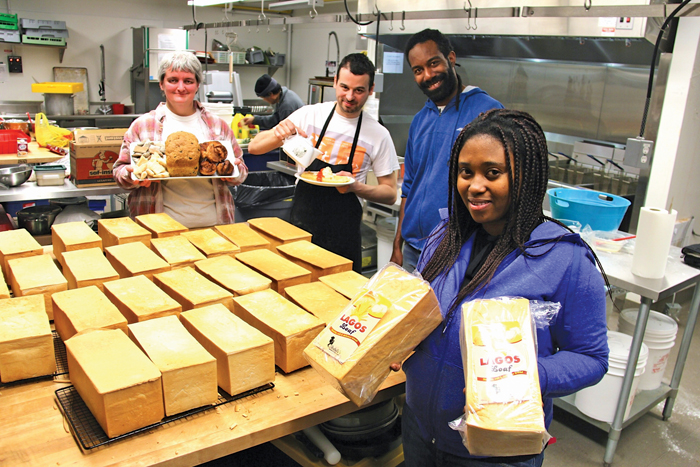Temi Akindipe has lived in Canada a long time, but never stopped missing the taste of a sweet, dense pan bread popular back home.
She knew fellow West Africans living in Manitoba missed it too.
That’s why this nurse by profession decided to become baker and sell the Lagos Loaf.
She now turns out hundreds of the loaves with their distinct rectangular shape in the basement of Knox United Church in downtown Winnipeg.
“We tried to commercialize our own kitchen, and called to find out what the codes are, and realized there was no way we could bake our bread to sell out of our home,” says Akindipe. “We were told to find a licensed kitchen.”
Read Also

Use-it-up meals stretch the post-holiday menu
Leftovers and extra food abound in the first weeks of January. Give your kitchen a winter reset, clean out the fridge and save on your grocery bill
As she began door knocking at various restaurants asking if space was available, she quickly learned that wasn’t easy.
“Then I discovered the kitchen at Knox,” she said. “It’s given me an opportunity to actually test my product.”
The Knox kitchen is a fully inspected, upgraded commercial food-producing space developed by Knox Centre Winnipeg to enable these types of microbusinesses to start up, says Natasha Ross, Knox Community Kitchen executive director.
“If you are a baker or a caterer, or if you are packaging food you can use our facility and meet all the health regulations to sell your food,” said Ross. They also operate a biweekly indoor farmers’ market at the same location.
The idea of a multiple-user kitchen for rent was an idea put forward in consultations with new Canadians living in their neighbourhood.
Many had a food business in mind, but couldn’t find low-cost spaces to rent that had an inspector’s approval and the equipment they needed.
It prompted Knox Centre Winnipeg to raise $500,000 for a complete renovation of the church’s old, outdated kitchen, upgrading it to commercial status with facilities such as a walk-in freezer, convection oven, large areas where multiple users can prepare food.
The kitchen opened for business in 2013 and today provides round-the-clock access seven days a week to fancy cake and pastry bakers, caterers and others specializing in ethnic foods.
Rent paid by users contributes to the operating costs.
“The people in our kitchen would not be able to afford their own commercial kitchen, would not even think about getting their businesses off the ground without a kitchen such as ours,” Ross said.
Now 14 in Manitoba
That’s the whole idea behind the emerging concept of the community-based commercial kitchen.
Knox kitchen is one of 14 such facilities now listed on Manitoba Agriculture, Food and Rural Development’s website as commercial kitchen space for rent at reasonable rates.
They’re doing the same thing as Knox, albeit on a much smaller scale at the Teulon Rockwood Community Hall, says Chris Hornby, that community’s recreation director.
Two individuals rent the kitchen in their hall, one using it to prepare large batches of perogies, the other making food products for sale at farmers’ markets.
They charge a nominal fee of $55 a day, and hope to expand the numbers of users as a way to earn much-needed revenues to help with the facility’s operating costs.
“Renting the kitchen is ideal for buildings like this,” Hornby said.
“If we could keep it busy two or three days a week that would make us really happy.”
They hope to add more kitchens to their list shortly, says Jayne Kjaldgaard, MAFRD’s business development specialist in food commercialization and marketing.
MAFRD staff started putting the list together at the end of 2014.
“I can see it growing to 20 or 30 places quite fast,” said Kjaldgaard, who has spoken to numerous community groups about the idea.
Some aren’t interested, she notes, but that’s because this is a new idea. Most boards of facilities such as churches, halls or Legions simply haven’t had the idea before of renting out their kitchen separately from the rest of the facility.
Yet, there are many would-be food entrepreneurs, who, like Akindipe, see potential for a food business startup but find the cost of equipping a kitchen of their own prohibitive.
“We just want to be able to connect users with these facilities,” said Kjaldgaard, who facilitated a meeting in Teulon this month where MAFRD staff and other kitchen operators talked about which facility is right for the kinds of businesses people want to operate.
MAFRD spent about $80,000 to upgrade a kitchen inside the War Veterans Hall in Swan River in 2012 to serve as a rent-a-kitchen space. Carly Minish, creator of Smak Dab, a line of gourmet mustards, makes the 5-1/2-hour drive from Winnipeg to Swan River to rent the fully equipped small-scale processing plant for $50 a day to make large batches of her gourmet mustards.
“It’s a great facility,” said Minish, adding that she knows the facility owners would like to see it used more often. The space is equipped with commercial-size mixers, kettles, a walk-in freezer and rollers and sheeters for dough and pasta products.
“It makes a big difference to me in terms of production,” Minish added. “In the kitchen I was in before, I was making 50 (jars) and in the other I’m making 10 dozen.”
The ‘rent-a-kitchen’ concept has been talked about for nearly a decade in Manitoba, but only now starting to catch on as public facility owners with kitchens sitting idle much of the time are approached by small would-be food product developers.
Akindipe, now co-owner of her small Arabelle’s Bakery, says her long-term goal is to buy a bakery someday. If that happens, Knox kitchen will have made it happen.
“We need to scale up because our production has increased,” she said. “I will always be grateful that I had this kitchen to start up. Because otherwise there’s no way I would have been able to afford to even start to commercialize my product.”
MAFRD’s entire list of commerical kitchens for rent is found at http://www.gov.mb.ca/agriculture/online-resources/community-kitchens-listing.html.


















